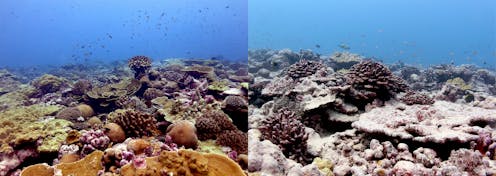Source: The Conversation (Au and NZ) – By Michael Green, Host + Producer, The Conversation

Earlier this week, the United Nations’ Intergovernmental Panel on Climate Change (IPCC) released its Synthesis Report, bringing together six previous assessments on the state of the Earth’s climate.
The verdict is sobering. Global temperatures are now 1.1℃ above pre-industrial levels, and they’re likely to reach 1.5℃ in the early 2030s. As climate change experts Frank Jotzo and Mark Howden wrote for The Conversation: “The world is in deep trouble on climate change, but if we really put our shoulder to the wheel we can turn things around”.
So how do the IPCC’s climate scientists know the climate is changing? And what does it feel like to carry that knowledge and do their vital work at this crucial juncture in Earth’s history?
Fear & Wonder is a new podcast from The Conversation that seeks to answer these questions. It takes you inside the UN’s era-defining climate report via the hearts and minds of the scientists who wrote it.
Read more:
Introducing Fear and Wonder: The Conversation’s new climate podcast
The show is hosted by us: Dr Joelle Gergis – a climate scientist and lead IPCC author – and award-winning journalist Michael Green.
In this first episode, we introduce the series and look at long-term observations that help scientists determine how the climate has changed. With help from French scientist Professor Valérie Masson-Delmotte – a co-chair of the IPCC’s Working Group One – they explain what the IPCC is, what its monumental climate reports contain and how they’re put together.
We speak to Professor Kim Cobb, a US-based paleoclimatologist, who describes the coral reef she has researched her whole career and its destruction in the El Niño of 2016. She also shares her experience of what it feels like to be a climate scientist at this important point in human history.
We also speak to Professor Ed Hawkins, who explains how historical weather observations are significantly improving our understanding of extreme events such as severe storms, and how these records can help estimate future climate change risk. Hawkins tells the story of a citizen science project to digitise millions of weather observations from locations such as from Ben Nevis, the highest peak in the United Kingdom.
To listen and subscribe, click here, or click the icon for your favourite podcast app in the graphic above.
Fear and Wonder is sponsored by the Climate Council, an independent, evidence-based organisation working on climate science, impacts and solutions.
![]()
Dr Joelle Gergis has received funding from the Australian Research Council and the Australian Government’s Department of Industry, Science, Energy and Resources in the past. She currently receives funding from the Australian National University.
Michael Green does not work for, consult, own shares in or receive funding from any company or organisation that would benefit from this article, and has disclosed no relevant affiliations beyond their academic appointment.
– ref. Fear and Wonder podcast: how scientists know the climate is changing – https://theconversation.com/fear-and-wonder-podcast-how-scientists-know-the-climate-is-changing-202237







